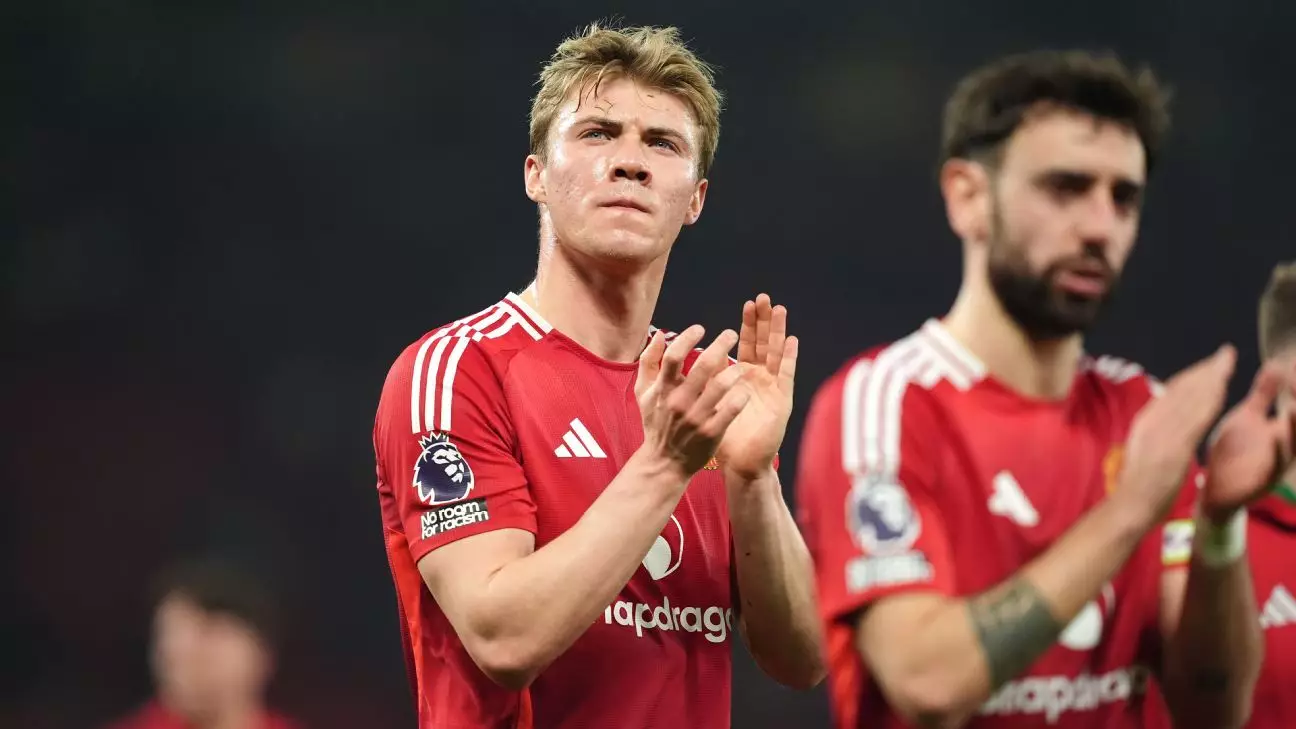As Ruben Amorim pondered over Manchester United’s latest outing against Real Sociedad in the Europa League, he was struck by a bittersweet realization. His side had managed a commendable performance, yet something vital was still amiss—namely, the ability to convert available opportunities into goals. While the match held promise, generating half-chances rather than clear-cut scoring opportunities, the outcome—a 1-1 stalemate—left plenty to be desired. Amorim’s recognition of the team’s need for improvement encapsulated the broader challenges faced by the club and highlighted the precarious balance of emotions leading into the second leg.
United’s goal against Real Sociedad by Joshua Zirkzee was a small victory in an otherwise tense affair. However, the Spanish side’s inability to score compounds the pressure on United. After struggling to find their shooting boots, it’s evident that when the stakes rise, and tension mounts, confidence can quickly wane. Real Sociedad’s coach, Imanol Alguacil, understands that as the match approaches, the psychological burden will weigh heavily on United.
The Chronic Goal-Scoring Dilemma
Manchester United’s scoring challenges stretch back years, preceding Amorim’s managerial term. Despite a brief resurgence during Ole Gunnar Solskjaer’s penultimate season, where the club soared to become the second-highest scoring team in the Premier League, those days feel like a distant memory. The stark reality now is that the overall tally of goals since the 2020-21 season pales in comparison to rivals like Manchester City, who have surged ahead with an impressive goal-scoring record. Currently, United finds itself languishing near the bottom of the statistical table, making only a handful of successful strikes this season.
The numbers don’t lie: ranking 10th for total shots taken yet lingering in 17th for shot conversion rate exposes a fundamental flaw in the team’s attacking framework. With players like Aston Villa’s strikers excelling in similar shot volume yet achieving over 30% more goals, it’s clear that a disconnect exists in United’s system. The club has enlisted fresh talent in recent years, yet their signings—particularly in attacking positions—have often lacked a proven track record, raising questions about the sufficiency of their recruitment strategy.
Younger Talent, Growing Pains
The likes of Rasmus Hojlund, whose inexperience raises a red flag, have certainly borne the brunt of high expectations. Despite being lauded for potential, Hojlund’s troubling statistics, such as the fewest touches in the box per 90 minutes among strikers who’ve logged substantial playtime, paint a grim picture. Leadership and confidence are paramount for any striker, yet Hojlund’s hesitance when on the brink of finishing reveals a player struggling under the weight of high expectations.
The pressure intensifies for players thrust into pivotal roles with little experience or proven success as their support system crumbles. With heavy hearts, fans have observed moments where opportunities have slipped through Hojlund’s fingers, leading to precious scoring chances evaporating. It is troubling that even after ample chances, he struggles to exhibit the instinctive qualities of a top-notch forward.
The Bigger Picture: Club Dynamics and Accountability
Amidst the mounting scrutiny, opinions flood in from various corners of the organization. Sir Jim Ratcliffe’s harsh words on underperforming players, along with vocal critiques of financial investments, add another layer of complexity to the situation. The arrival of new leadership often comes with high expectations, but it can also lead to friction as players grapple with their roles and responsibilities. Amorim finds himself in an enviable yet unenviable position; he must galvanize a group of underperforming athletes while contending with external pressures and voices questioning their potential.
His unwavering support for players like Bruno Fernandes, who embodies a resilient exemplification of leadership, hopes to instill confidence in the locker room. However, the lingering specter of whether Amorim can navigate these treacherous waters looms large. The Europa League match against Real Sociedad isn’t just another game; it’s a defining moment for the club this season—victory could rekindle aspirations, while defeat would likely sound the death knell for an already beleaguered campaign.
Financial Implications and Future Prospects
Recent comments from club CEO Omar Berrada indicate the financial stakes tied to the European competition. Achieving Champions League qualification would bring a much-needed financial boost, enabling the team to invest in talent that aligns with Amorim’s vision. In times where crises often breed chaos, the path toward redemption must be paved with thoughtful strategies, renewed confidence, and keen insights into player capabilities.
While Amorim acknowledges that a Europa League title may only offer temporary relief, the potential impact on squad revitalization cannot be overstated. It’s a moment that could not only alter the club’s fortunes but reignite the aspirations of a fanbase clamoring for a return to the glory days of prolific goal scoring and competitive excellence.
In navigating this complex tapestry of hope, despair, and potential, Amorim must emerge as both a tactician and a motivator; every touch of the ball carries the weight of that responsibility as Manchester United’s future hangs precariously in the balance.

